七年级牛津译林版知识点
译林版牛津英语七年级上册期末复习知识点
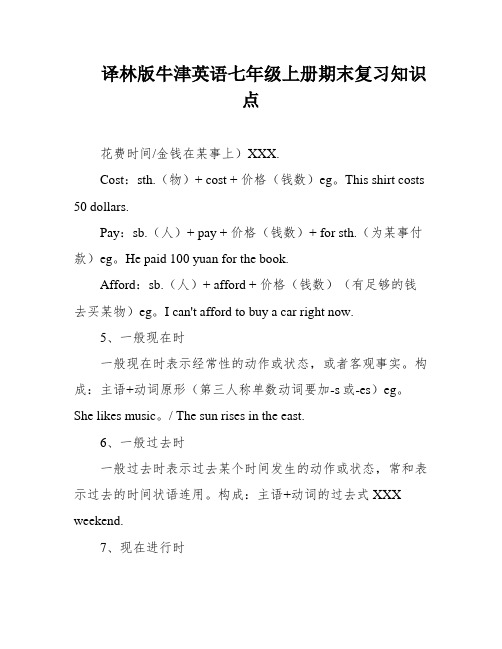
译林版牛津英语七年级上册期末复习知识点花费时间/金钱在某事上)XXX.Cost:sth.(物)+ cost + 价格(钱数)eg。
This shirt costs 50 dollars.Pay:sb.(人)+ pay + 价格(钱数)+ for sth.(为某事付款)eg。
He paid 100 yuan for the book.Afford:sb.(人)+ afford + 价格(钱数)(有足够的钱去买某物)eg。
I can't afford to buy a car right now.5、一般现在时一般现在时表示经常性的动作或状态,或者客观事实。
构成:主语+动词原形(第三人称单数动词要加-s或-es)eg。
She likes music。
/ The sun rises in the east.6、一般过去时一般过去时表示过去某个时间发生的动作或状态,常和表示过去的时间状语连用。
构成:主语+动词的过去式XXX weekend.7、现在进行时现在进行时表示现在正在进行的动作,常和now。
XXX。
currently等时间状语连用。
构成:主语+be动词(am/is/are)+动词-XXX.8、一般将来时一般将来时表示将来某个时间要发生的动作或状态,常和表示将来的时间状语连用。
构成:主语+will/shall+动词原形eg。
I will go to Beijing next month。
/ She shall visit her XXX.9、情态动词情态动词有can/could。
may/might。
must。
shall/should。
will/would。
ought to等。
它们的用法有所不同,但都表示某种语气或情态。
eg。
You should study hard for the exam。
/ She must be at home now.10、被动语态被动语态表示动作的承受者在句子中作主语,动作的执行者在句子中用by引出。
牛津译林版七年级上英语期末复习全册知识点归纳
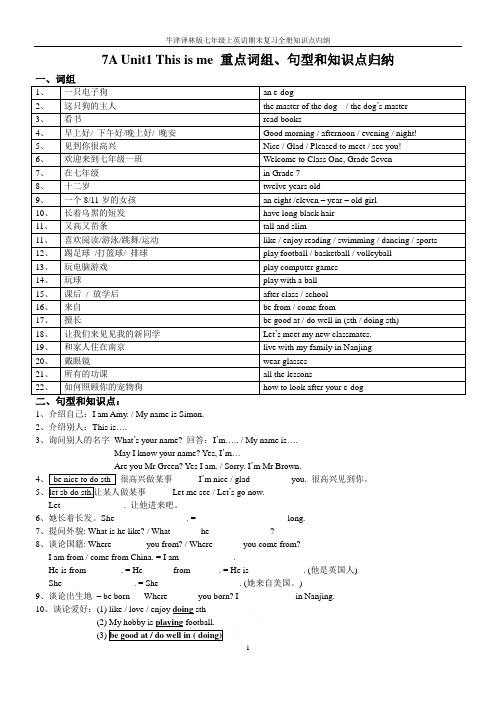
7A Unit1 This is me 重点词组、句型和知识点归纳1、介绍自己:I am Amy. / My name is Simon.2、介绍别人:This is….3、询问别人的名字What’s your name? 回答:I’m….. / My name is….May I know your name? Yes, I’m…Are you Mr Green? Yes I am. / Sorry. I’m Mr Brown.4很高兴做某事I’m nice / glad _________you. 很高兴见到你。
5Let me see / Let’s go now.Let ______________. 让他进来吧。
6、她长着长发。
She _____ _____ _____. = _______ ______ ______ long.7、提问外貌: What is he like? / What ______ he ______ _______?8、谈论国籍: Where _______ you from? / Where ______ you come from?I am from / come from China. = I am ____________.He is from _______ . = He ______ from ______. = He is ____________. (他是英国人)She ________________. = She __________________. (她来自美国。
)9、谈论出生地–10、谈论爱好:She is good at swimming. = She does well in dancing. = She ______ ______.= She is a _____ _______.注意do well in 的否定句例如:他不擅长跳舞。
Unit7知识点牛津译林版七年级英语下册

7B Unit71.ability n.能力①复数:②有能力做某事==③有不同的能力2.Believe it or not.3.Look out. ①当心;注意=②③向外看···④从···向外看4.短语:①种树②给某人让座给某人某物=③为某人收集某物为孩子们收集一些书收集n.④打伞干净公园(代词放中间)e.g.打扫干净它5.What can we do for the children in poor areas?我们能为贫困地区的孩子们做什么?①can =②辨析“can”和“be able to”③在贫困地区6.They need clothes and shoes most.他们最需要衣服和鞋子。
①need v.需要1)需要某物2)需要做某事②最需要···7.Some families are not even able to pay for pens and notebooks.一些家庭甚至没钱买笔和本子。
①able 能够1)反义词:2)能够做某事②pay v.为···付钱1)某人为···付钱2)复习“花费”(1)又花钱又花时间(2)只花时间(3)只花钱E.g. 他花了三十块买了三本书。
HeMike花了三十分钟做作业。
8.We can raise some money for them to buy these things.我们为他们筹一些钱去买这些东西。
①raise v. 1)种植种植小麦2)抚养抚养孩子3)筹集为某人筹集某物(去做某事)E.g.为孩子们筹集钱举办聚会②buy v.买1)动ing:过去式:2)给某人买某物=9.We can also collect some books for the children.否定句:We .10.What a brave young man!多么勇敢的一个年轻男人!①同义句:②【重点】感叹句句式:(1)What + (a/an) + 形容词+ 名词!(2)How + 形容词/副词+ 主语+ 谓语!强调部分提前提示:正常句式语序→主语+ 谓语+ 宾语.E.g. Mike做作业做的多么认真啊!正常语序:感叹句:那个小男孩真可爱啊!正常语序:感叹句:=11.He was brave enough to save his neighbour from a fire.他足够勇敢从火中救出他的邻居。
牛津译林版七年级英语上册Unit4-重点词组、难点解析、语法知识点复习
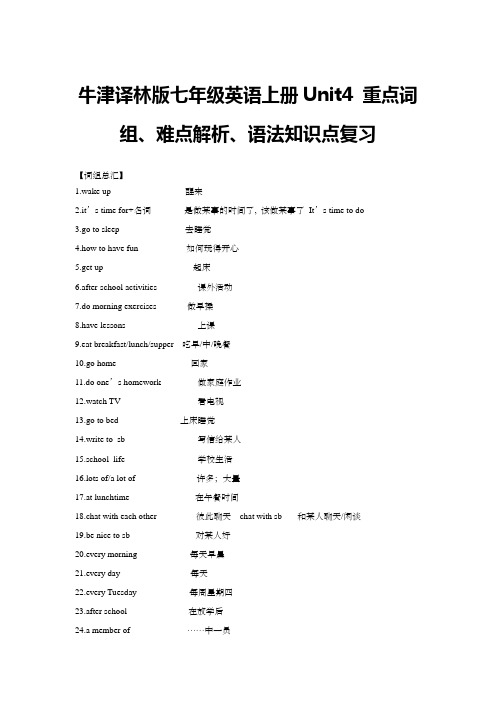
牛津译林版七年级英语上册Unit4 重点词组、难点解析、语法知识点复习【词组总汇】1.wake up 醒来2.it’s time for+名词是做某事的时间了, 该做某事了It’s time to do3.go to sleep 去睡觉4.how to have fun 如何玩得开心5.get up 起床6.after-school activities 课外活动7.do morning exercises 做早操8.have lessons 上课9.eat breakfast/lunch/supper 吃早/中/晚餐10.go home 回家11.do one’s homework 做家庭作业12.watch TV 看电视13.go to bed 上床睡觉14.write to sb 写信给某人15.school life 学校生活16.lots of/a lot of 许多;大量17.at lunchtime 在午餐时间18.chat with each other 彼此聊天chat with sb 和某人聊天/闲谈19.be nice to sb 对某人好20.every morning 每天早晨21.every day 每天22.every Tuesday 每周星期四23.after school 在放学后24.a member of ……中一员25.the Swimming Club 游泳兴趣小组26.have a good time 玩的开心27.email sb 给某人发电子邮件28.play games 玩游戏, 进行比赛29.twice a week 一周两次30.have fun 娱乐,乐趣;开心P.27-3031.listen to the radio 听收音机32.make a model plane 制作模型飞机33.read newspapers 看报read books 看书34.write emails 写邮件35.watch football matches 看球赛36.watch too much TV 看电视太多37.listen to music 听音乐38.listen to the teacher 听老师讲39.walk a dog 遛狗40.a piece of good news 一则好消息41.in the school football team 在学校足球队42.all the time 一直43.know (a lot) about…对……了解(很多)44.read comic books 看连环漫画书45.on the volleyball court 在排球场46.from...to…从……到……47.meet up with sb. 约见某人48.do their homework 做他们的作业49.under a big tree 在大树下50.go to one’s dancing lesson 去上舞蹈课51.have (no) time to do sth. 有(没有)时间做某事52.have a lot of new friends 有许多新朋友53.teach us English 教我们英语54.talk about…谈论关于……55.at home 在家56.say hello to…向……问好P.31-3757.the Class 1,Grade 7 students 七年级一班学生58.go on a trip 旅行, 旅游have one’s trip59.look at the posters 看海报60.more than 多于;超过61.twice a week 一星期两次62.the China Space Museum 中国航空博物馆63.the China Science and Technology Museum 中国科技博物馆64.next Monday 下周一65.each student 每个学生66.thank you for doing sth 为做某事而谢谢你anize the class trip 组织班级旅游68.I would like to+动词原形愿意干某事;想要干某事69.the price for………的价格70.be open/be closed 开着、关着71.look forward to…期盼;盼望72.enjoy…very much 非常喜爱……73.need to do sth 需要做……74.borrow a pen 借一支钢笔75.be busy doing 忙于做某事76.be good for 有益于77.help sb do sth 帮助某人做某事78.get ready for 准备……79.learn more about 更多了解……80.the answer to ………的答案81.the Computer Club 电脑兴趣小组【难点解析】1.Is it time for breakfast? 是吃早餐的时间了吗?it’s time for+名词, “是做某事的时间了, 该做某事了”=it’s time to+动词原形.例如:It’s time for class.是上课的时间了。
Unit1知识点梳理2023-2024学年牛津译林版英语七年级上册

第一讲 7A Unit1 Language Point 梳理一.Unit 1 重点语法1.would like / love sth.想要某物例句:Would you like some water?肯定回答:Yes, please. Yes, I’d like / love to.否定回答:No, thanks.2.would like / love to do sth.想要做某事例句:Would you like to drink some water?肯定回答: Yes, I’d like / love to.否定回答:I’d like / love to, but …… .3.糖葫芦形容词结构:数词+ 名词(单数) + (形容词)例:80foothigh 80 英尺高fiveinchtall 5英寸高的7yearold 7岁的注意:①名词必须用单数②只能放在名词前作定语,不能放在be 动词后作表语。
4.read/look/see/watch几个“看”的用法和区别:look 强调看的动作①系动词。
译作看起来,后接形容词。
She looks happy.②不及物动词。
译作看,词组:look at…,用副词修饰。
Tom looked at me angrily.see 及物动词,译作看到,无进行时态,强调看的结果。
watch 及物动词,译作观看,注视。
强调观看正在进行中的,发生变化的活动过程,常用于看电视、看球赛、看演出等。
read 及物动词,译作阅读。
强调看文字内容的东西,常用于看书、看报纸、看杂志等。
5.疑问代词what、which、who 及疑问副词how、when 、where可以和动词不定式连用。
what to do 做什么which to do 做哪个who to do 如何做how to do 谁做when to do 什么时候做where to do 在哪里做6.“疑问词+ to do” 结构经常放在know,learn,see ,ask等动词后做宾语。
牛津译林版七年级知识点汇总
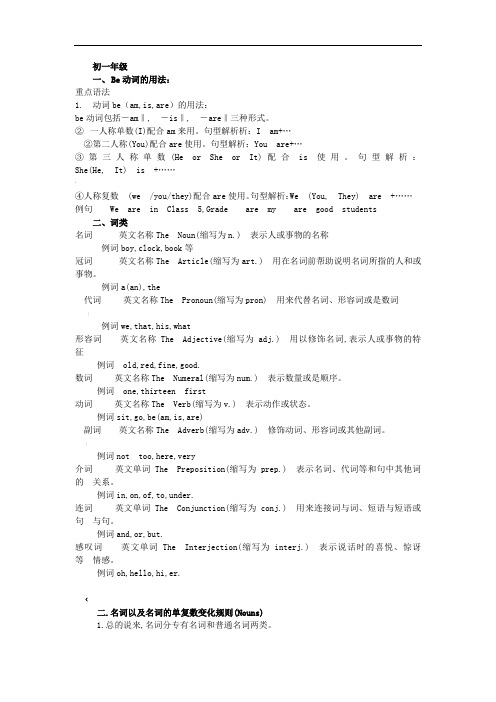
初一年级一、Be动词的用法:重点语法1. 动词be(am,is,are)的用法:be动词包括―am‖, ―is‖, ―are‖三种形式。
②一人称单数(I)配合am来用。
句型解析析:I am+…②第二人称(You)配合are使用。
句型解析:You are+…③第三人称单数(He or She or It)配合is使用。
句型解析:She(He, It) is +……'④人称复数(we /you/they)配合are使用。
句型解析:We (You, They) are +……例句We are in Class 5,Grade are my are good students二、词类名词英文名称The Noun(缩写为n.) 表示人或事物的名称例词boy,clock,book等冠词英文名称The Article(缩写为art.) 用在名词前帮助说明名词所指的人和或事物。
例词a(an),the代词英文名称The Pronoun(缩写为pron) 用来代替名词、形容词或是数词|例词we,that,his,what形容词英文名称The Adjective(缩写为adj.) 用以修饰名词,表示人或事物的特征例词old,red,fine,good.数词英文名称The Numeral(缩写为num.) 表示数量或是顺序。
例词one,thirteen first动词英文名称The Verb(缩写为v.) 表示动作或状态。
例词sit,go,be(am,is,are)副词英文名称The Adverb(缩写为adv.) 修饰动词、形容词或其他副词。
|例词not too,here,very介词英文单词The Preposition(缩写为prep.) 表示名词、代词等和句中其他词的关系。
例词in,on,of,to,under.连词英文单词The Conjunction(缩写为conj.) 用来连接词与词、短语与短语或句与句。
牛津译林版英语七年级(上册)分单元知识点归纳总结[Unit1_8]]
![牛津译林版英语七年级(上册)分单元知识点归纳总结[Unit1_8]]](https://img.taocdn.com/s3/m/0e173f3e7cd184254b353535.png)
牛津译林版英语七年级上册全册知识点归纳总结(最新)Unit one一、词汇知识点整理:look after \ take care of 照顾 ;表示look 的短语:look after照顾look at 看…;look for 寻找look like 看起来像…on the first day 在第一天 Class One, Grade Seven (先说班级,再说年级,且大写)。
play football 踢足球 after school 放学后be\come from 来自 be good at \do well in 擅长fly kites 放风筝 go home 回家listen to music 听音乐 play a game 玩游戏wear glasses 戴眼镜 at school 在学校all the lessons 所有的课程 talk about 谈论over there 那里 a lot of hobbies 许多爱好二、结构用法:love\like doing sth 喜欢做某事let’s +动词原形让我们I am\My name is 我叫welcome to +地点欢迎来到This is 这是be good at \do well in doing 擅长做in Class…Grade…在几年级几班be from = come from + 地点, 意思是“来自某地”。
He is from Nanjing. P8 他来自南京。
live with…in…和谁住在哪里live with sb 和某人住一起;live in+ 城市名,住在某地; live on the ground floor 住在一楼(用介词on)I’m …year old. 我几岁了。
year(s) old ,……岁,如果数词大于1, year 要用复数years.问年龄要用How old “几岁”提问。
完整版)译林牛津初一上册英语知识点归纳

完整版)译林牛津初一上册英语知识点归纳Unit 1: This is me!In this unit。
we will learn some ___。
These include "look after" or "take care of" to mean to care for someone。
"on the first day" to refer to the first day of school。
"play football" to mean to play soccer。
"after school" to mean after classes are over。
"be good at" or "do well in" to mean to excel in something。
"fly kites" to mean to fly a kite。
"go home" to mean to return home。
"listen to music" to mean to listen to music。
"play a game" to mean to play a game。
"wear glasses" to mean to wear glasses。
"at school" to mean at the school。
"all the lessons" to mean all the classes。
"talk about" to mean to discuss something。
"over there" to refer to a place far away。
牛津译林版英语七年级上册各单元重要概念归纳

牛津译林版英语七年级上册各单元重要概
念归纳
单元一:你好
- 研究基本问候语和自我介绍
- 研究用英语介绍自己的名字、年龄和国籍
- 研究用英语进行简单的日常交流
单元二:我的家庭
- 研究用英语表达家庭成员的名字
- 研究用英语描述家庭成员的外貌和特征
- 研究用英语描述家庭成员的职业和兴趣爱好
单元三:我的学校生活
- 研究用英语表达学校设施和场所的名称
- 研究用英语描述学校日常生活的活动和安排
- 研究用英语介绍自己在学校的角色和职责
单元四:时间和日期
- 研究用英语表达星期、月份和季节的名称
- 研究用英语询问和回答关于时间和日期的问题- 研究用英语描述日常活动的时间和顺序
单元五:我的日常生活
- 研究用英语描述自己的日常活动和作息时间- 研究用英语询问和回答关于日常生活的问题- 研究用英语描述喜欢的食物、运动和爱好
单元六:购物
- 研究用英语表达购物场所和商品的名称
- 研究用英语询问和回答关于购物的问题
- 研究用英语描述购物时的交流和讨价还价
单元七:体育运动
- 研究用英语表达不同的体育运动项目
- 研究用英语询问和回答关于体育运动的问题- 研究用英语描述自己参与过的体育运动经历
单元八:健康和饮食
- 研究用英语表达健康和饮食方面的词汇
- 研究用英语询问和回答关于健康和饮食的问题
- 研究用英语描述自己的饮食偏好和健康惯
以上为《牛津译林版英语七年级上册》各单元的重要概念归纳。
*Note:* *此文档为简要概述,以帮助读者快速了解各单元内容,具体细节可参考教材。
*。
牛津译林七年级语法总结

牛津译林七年级语法总结 Updated by Jack on December 25,2020 at 10:00 am7A语法总结一、一般现在时第一,动词be 的三变化 am is are. 我(I)用am ,你(you)用are ,is 用于他(he)她(she)它(it),单数名词用is,复数名词都用are句型结构:1、肯定句:主语+am\is\are … It is a football.2、否定句:主语+am\is\are+not… It is not a football.3、一般疑问句:Am\Is\Are+主语+其他?Is it a football 回答Yes, it is. No, it isn’t4、特殊疑问句:疑问句+am/is/are +主语+其他?What’s your name?用be 动词的适当形式填空1、She ________ my cousin. Her name _______ Li Jie.2、Tom and I ________ good friends3、What _____ this in English It ______ a book4、________ you Jack Yes, I _______5、What ________ those They ______ his notebooks.第二,行为动词的一般现在时行为动词的一般现在时的构成:主语+行为动词+(其他)当主语为第三人称单数(he, she, it)时,谓语动词也要用单数形式。
用好一般现在时,时间状态需牢记;主语人称是三单,动词要把-s/-es 添;基本用法要记清,状态习惯经常性。
行为动词的一般现在时的变化1.否定句:主语+ don’t/doesn’t + 动词原形+其他I don’t like bread.He doesn’t often play football.2.一般疑问句:Do/Does + 主语+动词原形+其他Do you often play football Yes, I am /No, I am notDoe s he often play football Yes, he does/ No, he doesn’t 3、特殊疑问句:特殊疑问句+一般疑问句?When do you go to school I go to school at seven o’clock.动词的三单形式的变化:动词三单现在时,一般在词尾加SS,x,ch,sh,在词尾,直接加上-es词尾若是字母o ,加上-es 不用愁。
Unit2知识点 牛津译林版英语七年级上册

7AU2知识点New words and expressions:1.walking/swimming/singing /dancing is my hobby.2.Really? /He’s really a paper tiger.3.a bowl of milk4.three times/once a year/twice a weekHow many time—once/three times.How often do you go home? Once a week.5.play tennis/basketball/volleyball/table tennis6.enjoy the school life/working in Beijing/living in Shanghai/myself(玩的开心)7.go swimming/fishing/shopping/walking/running8.eleven football players9.He’s in the football team=He’s a member of the football team10.in the Computer /Reading Club11.He’s free/He’s very busy12.I hope+ (I hope everyone swims very well)I hope to do sth (I hope to go to Beijing by plane.)13.Your dream comes true.14.He’s good at drawing—He draws well15.at weekends—at the weekend (Saturday and Sunday)16.Can I borrow your books? Of course.Here you are17.else What/whatwhere else can you see..?Is there anything else in today’s newspaper?Other+ other books18.a lot of/lots of =many or muchI have a lot of books to read.There’s lots of milk in the glass.19.have fun(in doing sth)/have a good timeHe has fun (in)playing games.20.talk about /of talk to /with me talk about the filmHe’s talking to us about the story21.a few basketball matches22.The twins are our heroesLanguage points:1.Do you have any books ?I don’t have any books2.I walk to school=I go to school on foot.He takes a bus to work=He goes to work by bus.Kate rides a bike to school=Kate goes to school by bike.3.many times a day/five times a week4.What’s your favourite sport? I like playing volleyball5.He often play basketball after school.6.I’m 12 years old.What about him/her/them?7.every week/day/year/Monday this week/evening8.my favourite football star9.She’s in the football club=She’s a member of the football club.10.He works in Beijing.He studies at No1 Middle School.11.He looks strong/ He feels happy/ Music sounds beautiful.12.in his free time,she studies English.13.He also enjoys listening to music=He enjoys listening to music ,too.14.It makes him strong. Listening to music makes her happy.15.He wants to play tennis with me in the next World Cup16.This is our English teacher. Who is this ?That’s Jim’s book. Whose book is that?He’s a teacher What’s he? What does he do?17.He plays tennis at school.What does he do at school?Where does he play tennis?18.He gets up at six. He doesn’t get up at six.Does he get up at six? What time does he get up?19.They do housework at home.They don’t do housework at home. Do they do housework at home? Where do they do housework?20.likes/plays, study—studies fly-flies watches/washes/dresses/goes/does21. ___Jim__ (get) up early? No,______.22.___the twins___(play) football? Yes,____.23.They___(not,read) English at home.He___(not,watch) TV at school.24.When______Sam______(go) to bed? He___(go) to bed at six.25.some of the students/many of the studentsSome of us, all of us26.He doesn’t like sports very much.27.What do you do after school?28.What else does he do?Who else can you see?29.Sometimes I listen to music.30.It makes me feel great.31.He plays volleyball with us/her/them32.read a lot of interesting books /newspapers33.Reading English is fun/interesting.My brother likes basketball very much/best.35.I often play volleyball with my friends after school.。
牛津译林版七年级英语上册Unit-1单元知识点归纳
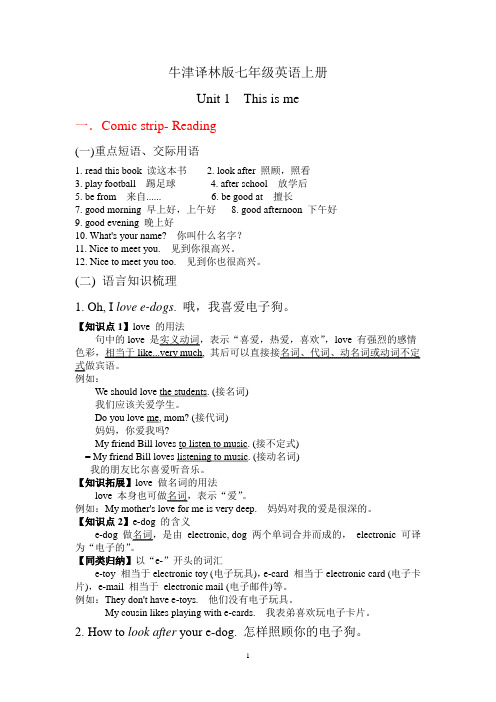
牛津译林版七年级英语上册Unit 1 This is me一.Comic strip- Reading(一)重点短语、交际用语1.read this book 读这本书2. look after 照顾,照看3. play football 踢足球4. after school 放学后5. be from 来自......6. be good at 擅长7. good morning 早上好,上午好8. good afternoon 下午好9. good evening 晚上好10. What's your name? 你叫什么名字?11. Nice to meet you. 见到你很高兴。
12. Nice to meet you too. 见到你也很高兴。
(二) 语言知识梳理1. Oh, I love e-dogs. 哦,我喜爱电子狗。
【知识点1】love 的用法句中的love 是实义动词,表示“喜爱,热爱,喜欢”,love 有强烈的感情色彩,相当于like...very much, 其后可以直接接名词、代词、动名词或动词不定式做宾语。
例如:We should love the students. (接名词)我们应该关爱学生。
Do you love me, mom? (接代词)妈妈,你爱我吗?My friend Bill loves to listen to music. (接不定式)= My friend Bill loves listening to music. (接动名词)我的朋友比尔喜爱听音乐。
【知识拓展】love 做名词的用法love 本身也可做名词,表示“爱”。
例如:My mother's love for me is very deep. 妈妈对我的爱是很深的。
【知识点2】e-dog 的含义e-dog 做名词,是由electronic, dog 两个单词合并而成的,electronic 可译为“电子的”。
译林版牛津英语七年级上册期末复习知识点总结
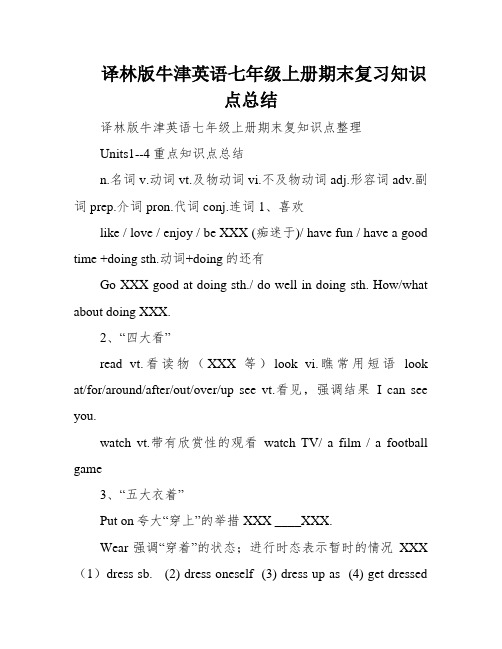
译林版牛津英语七年级上册期末复习知识点总结译林版牛津英语七年级上册期末复知识点整理Units1--4重点知识点总结n.名词v.动词vt.及物动词vi.不及物动词adj.形容词adv.副词prep.介词pron.代词conj.连词1、喜欢like / love / enjoy / be XXX (痴迷于)/ have fun / have a good time +doing sth.动词+doing的还有Go XXX good at doing sth./ do well in doing sth. How/what about doing XXX.2、“四大看”read vt.看读物(XXX等)look vi.瞧常用短语look at/for/around/after/out/over/up see vt.看见,强调结果I can see you.watch vt.带有欣赏性的观看watch TV/ a film / a football game3、“五大衣着”Put on夸大“穿上”的举措XXX ____XXX.Wear强调“穿着”的状态;进行时态表示暂时的情况XXX (1)dress sb. (2) dress oneself (3) dress up as (4) get dressedIn (穿戴)后接颜色(或衣服),表示状态look!Lucyis_____a red XXX后接人指衣服穿在某人身上看出区别来。
XXX red XXX.4、“四大花费”XXX:sb.(人)+ XXX.sb.(人)+ spend +工夫/款项+(in) XXX:sb.(人)+pay +款项+for sth. cost:sth.(物) + cost + sb.+款项XXX工夫XXX:it XXX sb. +时间+ to do sth.5、“三大地点副词”Home / there /here前不加任何的介词welcome home / come here / go there6、“三大使役动词”Make sb. do sth./ have sb. do sth. / let sb.do sth.7、见面打招呼用语(1)Nice to meet you . (2) Glad to meet you . (3) How are you ? (4) How are you doing ?(5)How is it going ?(6)How is everything going? (7) What’s up?8、基数词+year(s)+old表示“…岁”提问用“how old”名词性短语数词-year-old也表示年龄,但其为形容词性短语“前有冠词后有名(词)”Eg. Helen is 11 years old = Helen is an 11-year-old girl.9、Let’s与let us的区别Let’s do sth.指包孕听者(对方)和说者(我们)都在内,透露表现发起Let us do sth.指“让(答应)我们做某事”而听者(对方)不做,只要“我们”做10、play+the+乐器类名词e.g. Play the pianoPlay +球类运动play+ football / play cards / play chess11、She comes from Shanghai= She is from Shanghai .注:如何提问Shanghai及如何改一般疑问句12、be good at =do well in = be clever at = study sth. wellBe good at (反) be bad at do well in (反) be poor in13、介词over的用法(1)”在…正上方”There is a bridge over the river. (2)”超出”A plane flies over the house(3)”跨越”There are over 20 boys in this class. (4)”竣事”Class is over! / Game is over.14、every one与everyone辨析区分(1)Every one能够与of连用,而everyone却不克不及与of连用Eg.every one of the children XXX(2) everyone只指人=everybody而every one既指人又可指物配合点:谓语动词都要用“三单”15、family的用法:“家庭”作为团体谓语动词用“单数”He has a big family.“家人”夸大成员,是复数寄义,谓语动词用“真相”My family are at home.拓展:个人名词有people、class、police、sheep、deer、furniture等16、all/ both/ each/every/neither/ either的用法all(1)三者或三者以上“所有、都”(2)all + the +名词(all the afternoon = the whole afternoon)(3)all放在行为动词前,名词前;be动词后(4) all of +宾格/名词复数Both(1)两者都(2)后可跟of +宾格/名词复数Both sides of XXX指两个或两个以上“每个”个别Each side of the XXX.Every指许多人或事物的“全体”后接名词单数Every student is here .所有人都在。
牛津译林版七年级英语上册Unit7语法知识点汇总
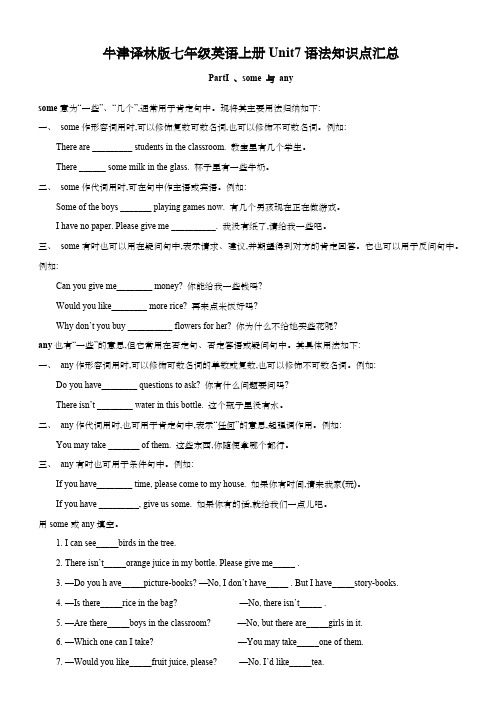
牛津译林版七年级英语上册Unit7语法知识点汇总PartI 、some 与anysome意为“一些”、“几个”,通常用于肯定句中。
现将其主要用法归纳如下:一、some作形容词用时,可以修饰复数可数名词,也可以修饰不可数名词。
例如: There are _________ students in the classroom. 教室里有几个学生。
There ______ some milk in the glass. 杯子里有一些牛奶。
二、some作代词用时,可在句中作主语或宾语。
例如: Some of the boys _______ playing games now. 有几个男孩现在正在做游戏。
I have no paper. Please give me __________. 我没有纸了,请给我一些吧。
三、some有时也可以用在疑问句中,表示请求、建议,并期望得到对方的肯定回答。
它也可以用于反问句中。
例如: Can you give me________ money? 你能给我一些钱吗? Would you like________ more rice? 再来点米饭好吗? Why don’t you buy __________ flowers for her? 你为什么不给她买些花呢?any也有“一些”的意思,但它常用在否定句、否定答语或疑问句中。
其具体用法如下:一、any作形容词用时,可以修饰可数名词的单数或复数,也可以修饰不可数名词。
例如: Do you have________ questions to ask? 你有什么问题要问吗? There isn’t ________ water in this bottle. 这个瓶子里没有水。
二、any作代词用时,也可用于肯定句中,表示“任何”的意思,起强调作用。
例如: You may take _______ of them. 这些东西,你随便拿哪个都行。
Unit5知识点 牛津译林版英语七年级上册

七A U5知识点1.Let’s celebrate Halloween( October 31)(vt动词:庆祝)2.have a guess3.dress up(as a ghost)装扮成 dress him/Jim(dress sb)只能+人4.He works in a hospital as a doctor.5.He’s late for school,because he gets up late.6.buy us some presents=buy some presents for us7.get together/go fishing together8.The bottle is full of milk.The moon is full and bright.9.in the USA/America10.paint the door red 11.inside the house12.knock on the door 13.shout for help14.if he works hard,he will be good at his English15.wear a special hat16.May I ask you some questions?Can I borrow some books from the library?17.dumplings/rice dumplings 18.grandparents’ houses19.other books/ what else/ what other things20.watch lion dance21.find out who can answer it22.can get more bookswe need more people to help us with our housework23.listen to the radio24.They’re taking photos25.fashion show26.at night/in the eveningOn Sunday night/on Saturday evening27.He seems young/strong28.different kinds of books29.There’re some clothes shop s around our school.30.It’s important to learn English well/an important party31.most of us/ most of the studentsSome of us / all of us/one of us32.I’m interested in this interesting story33.How about playing volleyball? How about yours/ What about some milk?34.the Spring Festival / Chinese New Year35.Thanksgiving Day(turkey), Mid-Autumn Festival(mooncakes),Dragon Boat Festival(rice dumplings) ,Halloween(pumpkin lanterns), Christmas/Chrismas trees36.Thanks for telling us a story./ Thanks for coming/Thank you for your help.38.We have some festivals in the USA.38.I like Halloween best=Halloween is my favourite festival.39.on October 31/December 2540.How do we celebrate it?How do you go to work? How does she learn English?He makes a living by selling newspapers./How does he make a living?41.have lot of fun---have a good time/enjoy myself42.have fun in playing football43.make pumpkin lanaerns—make lanterns out of pumpkins/oranges.44.When the evening comes/When he comes back,call me ,please.45.play a game with people inside46.shout “ trick or treat”47.give us some candy as a treat.48. play a trick on them 49.have a party51.on the evening of October31/ on a cold/ hot morning52.What’s he?/ What does she do? She’s a teacher.53.Which would you like,the red pen or the yellow one?The boy in the hat is Jim. Which boy is Jim?54.He’s Mr Li/our teacher. Who’s he?55.This is Jim’s bag. Whose bag is this?56.He gets up at six. When/What time does he get up?57.Why are you happy? Because it’s my birthday.58.What a big cake ! What an interesting book!59.Happy birthday to you---Thank you.60.go out for a birthday dinner/ go out for a walk.61.at a restaurant near my home62.get some books as birthday presents63.some other nice things64.Happy New Year ---The same to you.65.I’m on holiday in Beijing.66.Have a party to celebrate the Chinese New Year.67.take a lot of photos68.There’s a music and dance69.all the best70.You seem happy/young71.have shows about different fetivals around the world72.at the school hall 73.have a nice day74.What an important holiday!75.most Chinese families76.in January /February77.family members get together78.have a big dinner79.There’s a great Spring Festival Gala on TV every year.80.Our prarents get presents ready for us81.get red packets from our parents82.let off.watch fireworks.。
新牛津译林版七年级上册Unit8Let's celebrate!课本句型知识点

Unit 8 Let’s celebrate! Welcome to the unit·知识详解1 What’s your favourite festival, Millie 米莉, 你最喜欢什么节日(教材P93)Point What's one's favourite... 某人最喜欢的……是什么讲该句型用于询问某人最喜欢的人或事物,相当于“What…do/does+sb.+like best ”。
回答时可以用` favourite...+be+...”“...+be+one's favourite.”或“主语+like/love... (best) .”, 也可以直接说出最喜欢的人或事物。
—What's her favourite fruit (=What fruit does she like best )她最喜欢的水果是什么—Her favourite fruit is strawberries.她最喜欢的水果是草莓。
—What's your favourite season 你最喜欢的季节是什么—Winter. I can make a snowman.冬季。
我可以堆雪人。
(黄冈中考)2 Many people think it's a festival to remember a great poet,Qu Yuan.许多人认为这是一个纪念伟大诗人屈原的节日。
(教材P93) Point remember /rI'memb (r)/ v.纪念;记住高频讲(1) [及物动词]纪念;缅怀We remember our dead relatives during the QingmingFestival.我们在清明节缅怀死去的亲人。
(2) [及物动词]记住Remember that you may feel sleepy after taking the medicine.记住,吃了这药之后,你可能会犯困。
- 1、下载文档前请自行甄别文档内容的完整性,平台不提供额外的编辑、内容补充、找答案等附加服务。
- 2、"仅部分预览"的文档,不可在线预览部分如存在完整性等问题,可反馈申请退款(可完整预览的文档不适用该条件!)。
- 3、如文档侵犯您的权益,请联系客服反馈,我们会尽快为您处理(人工客服工作时间:9:00-18:30)。
七年级牛津译林版知识点
七年级英语课程是学习英语的基础阶段,牛津译林版是一套备受欢迎的英语学习教材。
这篇文章将介绍七年级牛津译林版英语的知识点,希望能对学习者的英语学习有所帮助。
一、语音和拼写
1.音标:英语的发音与音标密切相关,掌握音标对提升英语语音和拼写的准确性非常重要。
2.单词拼写:英语拼写相对简单,但也有一些规则需要遵守,例如e和i的使用、双写或不双写等。
二、基本的语法知识
1.名词:名词是英语中非常重要的词类,可以表示人、物、地点、时间等。
同时,它也有单数和复数的形式,还可以用作主语或宾语。
2.动词:动词在句子中通常作为谓语动词,表示动作、状态或事件。
还有一些特殊的动词形式,如动名词、不定式和分词。
3.形容词和副词:形容词和副词在英语中被广泛使用,形容词描述名词,而副词描述动词、形容词和其他副词。
三、基本的交流技巧
1.口语:口语是英语学习的重要组成部分,要学会准确地发音和使用正确的语法结构。
2.阅读:阅读技巧包括提高阅读速度、理解文章的主要内容,并注意语法结构和生词的使用。
四、词汇量和理解能力
1.单词和短语:学习英语时需要掌握大量的单词和短语,包括常用词汇、专业术语以及各种熟语和俚语。
2.学习理解:学习理解是一个重要的技能,包括根据上下文理解单词和短语的含义,还要学会提取文章的主旨和细节。
五、文化背景
学习英语还需要了解英语国家的文化背景,包括文学、历史、宗教、音乐、体育等方面。
只有了解这些,才能更好地理解英语的使用和背后的文化。
总之,七年级牛津译林版英语知识点的学习是英语学习的重要基础,也是掌握日常英语的必要条件。
掌握上述知识点,并不断练习和运用,相信能够在英语学习过程中取得更好的成果。
